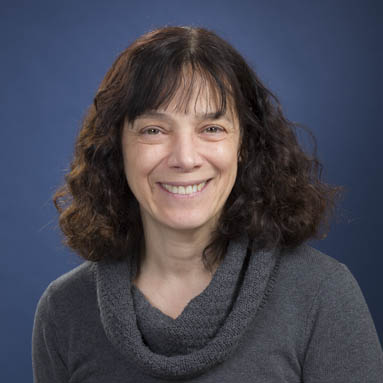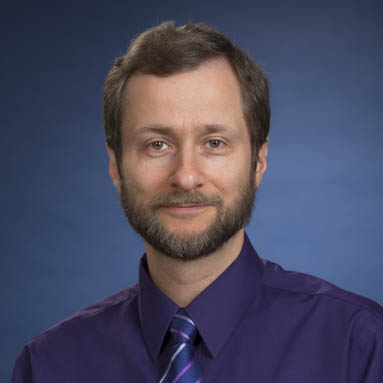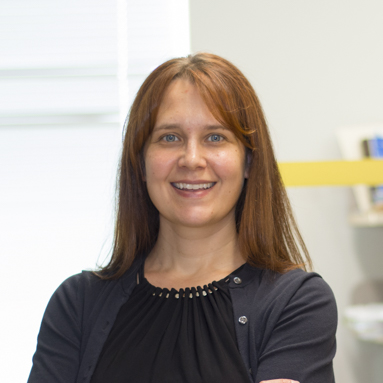WPI’s coursework-based master’s in biochemistry is a part-time program designed for targeted, in-depth investigations in advanced topics in modern biochemistry. Our flexible plan of study and individualized advising helps you tailor the program to your interests and career goals.
For a more robust program with additional research opportunities, consider WPI’s PhD degree program in Biochemistry.

In collaboration with a program advisor, you will select courses from biochemistry, chemistry, and related disciplines. Advanced topics you can explore include regulation of gene expression, membrane biophysics, and functional genomics. You can supplement your master’s in biochemistry studies with high-level undergraduate courses, as well as courses in engineering, business, mathematical sciences, and more.
You can choose a thesis option, consisting of high-level original research, or a non-thesis option with additional coursework. Hands-on research and lab work will also be an integral component of many of your courses.

The flexible degree program at WPI means your BCB degree offers a comprehensive plan tailored to your professional and personal goals.

At WPI, students’ work makes an immediate impact on some of the world’s most pressing challenges.

Students work one-on-one with faculty members to develop a targeted curriculum—so they can combine their interests in science, engineering, and even entrepreneurship.

Whether your interests are in biotech or pharmaceutical fields, or in areas such as energy or rare resources, the opportunities at WPI prepare you for your next steps.

Research at WPI is invigorating, exciting, and innovative.

WPI’s high-tech lab bays are organized by research focus, not departments, and invite multidisciplinary collaboration.

The flexible degree program at WPI means your BCB degree offers a comprehensive plan tailored to your professional and personal goals.

At WPI, students’ work makes an immediate impact on some of the world’s most pressing challenges.

Students work one-on-one with faculty members to develop a targeted curriculum—so they can combine their interests in science, engineering, and even entrepreneurship.

Whether your interests are in biotech or pharmaceutical fields, or in areas such as energy or rare resources, the opportunities at WPI prepare you for your next steps.

Research at WPI is invigorating, exciting, and innovative.

WPI’s high-tech lab bays are organized by research focus, not departments, and invite multidisciplinary collaboration.

The flexible degree program at WPI means your BCB degree offers a comprehensive plan tailored to your professional and personal goals.
As you pursue our biochemistry master’s program, you’ll have access to world-class facilities for your courses or thesis-based research, including our state-of-the art Life Sciences Center at Gateway Park, Biomanufacturing Education and Training Center, and its 3,500-square-foot vivarium.
Graduate Studies Series.
Team members from Graduate & Professional Studies host quick and convenient webinars designed to highlight popular topics when starting grad school. Take a deep dive into specific areas of interest such as how to secure funding, how to ace your application, an overview of student services, and more!
Faculty Profiles

Suzanne Scarlata, Richard Whitcomb Professor of Chemistry and Biochemistry, joined the university faculty in 2016. She studies how small molecules in the bloodstream can change the behavior of cells. In particular, she is interested in how certain hormones and neurotransmitters can activate a family of organic molecules known as G proteins (guanine nucleotide-binding proteins), which are involved in transmitting signals from various stimuli from the exterior to the interior of cells.

Projects in the Burdette group start with synthesis. We use an array of synthetic techniques to make light-reactive small molecule metal ion chelators (photocages), and an equally wide number of analytical techniques to characterize the metal binding properties and photochemistry of those complexes. We also make and modify metal organic frameworks (MOFs) with solvothermal and other methods. Both photocages and MOFs can be applied to a variety of applications from human health to functional chemical tools.

Our research integrates investigating the structure and function of targeted membrane proteins with development of mixed reality tools for workforce development. We combine biochemical and biophysical techniques to investigate the structure and function of two classes of membrane proteins. In the first instance, we are investigating the mechanism of a zinc transporter, hZIP4. This protein has been implicated in the initiation and progression of pancreatic cancer. Despite the central role of this protein in cellular homeostasis, the mechanism of cation transport is not well understood.

What makes a particular material efficient at converting sunlight to electrical or chemical energy? Conversely, what makes a material a poor energy converter? The Grimmgroup is motivated by quantifying and controlling the bulk and surface properties of solar energy conversion materials. As a research group in the Department of Chemistry and Biochemistry at Worcester Polytechnic Institute, we seek an atom- and bond-level understanding of material properties.

I am a computational physical chemist. My research is in the areas of force field building and applications. Special attention is given to creating polarizable force fields for organic and biophysical systems, including proteins and protein-ligand complexes. I teach classes in physical, computational and general chemistry. Simulations of proteins is very important in biomedical research because proteins play crucial role in a large number of biological phenomena, both benign and harmful.

Research in the Mattson Group is a combination of catalyst design, methodology development, and complex molecule synthesis. Our catalyst design program is focused on the synthesis and study of new families of non-covalent catalysts, including boronate ureas and silanediols, that are able to promote new reactivity patterns. The catalyst design and associated reaction development programs are currently geared toward the synthesis of enantioenriched nitrogen and oxygen heterocycles that frequently appear in naturally occurring bioactive compounds.

Membranes are composed of hundreds of distinct kinds of phospholipids, and the types of lipids that are found within a membrane bilayer impact its biophysical properties including its fluidity, permeability and susceptibility to damage. Our primary interest is in understanding the mechanisms that control the phospholipid composition and that preserve the membrane over time. We use stable isotope tracing strategies and mass spectrometry to quantify phospholipid abundance and dynamics in the model organism, C. elegans.

Suzanne Scarlata, Richard Whitcomb Professor of Chemistry and Biochemistry, joined the university faculty in 2016. She studies how small molecules in the bloodstream can change the behavior of cells. In particular, she is interested in how certain hormones and neurotransmitters can activate a family of organic molecules known as G proteins (guanine nucleotide-binding proteins), which are involved in transmitting signals from various stimuli from the exterior to the interior of cells.

Projects in the Burdette group start with synthesis. We use an array of synthetic techniques to make light-reactive small molecule metal ion chelators (photocages), and an equally wide number of analytical techniques to characterize the metal binding properties and photochemistry of those complexes. We also make and modify metal organic frameworks (MOFs) with solvothermal and other methods. Both photocages and MOFs can be applied to a variety of applications from human health to functional chemical tools.

Our research integrates investigating the structure and function of targeted membrane proteins with development of mixed reality tools for workforce development. We combine biochemical and biophysical techniques to investigate the structure and function of two classes of membrane proteins. In the first instance, we are investigating the mechanism of a zinc transporter, hZIP4. This protein has been implicated in the initiation and progression of pancreatic cancer. Despite the central role of this protein in cellular homeostasis, the mechanism of cation transport is not well understood.

What makes a particular material efficient at converting sunlight to electrical or chemical energy? Conversely, what makes a material a poor energy converter? The Grimmgroup is motivated by quantifying and controlling the bulk and surface properties of solar energy conversion materials. As a research group in the Department of Chemistry and Biochemistry at Worcester Polytechnic Institute, we seek an atom- and bond-level understanding of material properties.

I am a computational physical chemist. My research is in the areas of force field building and applications. Special attention is given to creating polarizable force fields for organic and biophysical systems, including proteins and protein-ligand complexes. I teach classes in physical, computational and general chemistry. Simulations of proteins is very important in biomedical research because proteins play crucial role in a large number of biological phenomena, both benign and harmful.

Research in the Mattson Group is a combination of catalyst design, methodology development, and complex molecule synthesis. Our catalyst design program is focused on the synthesis and study of new families of non-covalent catalysts, including boronate ureas and silanediols, that are able to promote new reactivity patterns. The catalyst design and associated reaction development programs are currently geared toward the synthesis of enantioenriched nitrogen and oxygen heterocycles that frequently appear in naturally occurring bioactive compounds.

Membranes are composed of hundreds of distinct kinds of phospholipids, and the types of lipids that are found within a membrane bilayer impact its biophysical properties including its fluidity, permeability and susceptibility to damage. Our primary interest is in understanding the mechanisms that control the phospholipid composition and that preserve the membrane over time. We use stable isotope tracing strategies and mass spectrometry to quantify phospholipid abundance and dynamics in the model organism, C. elegans.

Suzanne Scarlata, Richard Whitcomb Professor of Chemistry and Biochemistry, joined the university faculty in 2016. She studies how small molecules in the bloodstream can change the behavior of cells. In particular, she is interested in how certain hormones and neurotransmitters can activate a family of organic molecules known as G proteins (guanine nucleotide-binding proteins), which are involved in transmitting signals from various stimuli from the exterior to the interior of cells.
Have questions?
WPI's dedicated graduate student support team can help.
Refer a Friend
Do you have a friend, colleague, or family member who might be interested in a WPI graduate program? Click below to tell them about our programs.
Explore Where a Master’s in Biochemistry Can Take You
Are you curious about things like MS biochemistry salary, jobs, and how you can push the boundaries in your career after graduation? We’ve got you covered. Explore what you can do with an MS in biochemistry, career outcomes, average salary data, and more on our career outlook page.
Study How Substances Transform with a Master’s in Chemistry
Maybe you have a passion for investigating how substances interact and change? With our master’s in chemistry, you’ll have the opportunity to study advanced topics in modern chemistry like molecular modeling, chemical spectroscopy, and more. Love being in the lab and have an interest in medicinal plant-based chemistry? Be sure to explore our in-demand master’s in medicinal plant chemistry offered online for those interested in exceling in the plant-based industry.
Ready to Pursue a PhD? Consider Our Doctorate Programs in Chemistry or Biochemistry.
Maybe you’re actively in the industry and looking to gain an edge in the evolving, fast-paced environment? Consider earning a PhD in biochemistry or chemistry, which will provide the exposure to rigorous, hands-on research needed to make immediate impact on pressing challenges. Our biochemistry PhD enables students to conduct applied research on nanotechnology, biomedical sensors, clean energy, and more. Are you more intrigued by scientific study of matter? Consider earning a PhD in chemistry which focuses on green chemistry, the environment, and medicine.
Looking for a Foundation in Biochemistry?
Are you interested in the field of biochemistry but just starting your academic career? WPI’s bachelor’s in biochemistry gives you the classroom and laboratory experience you need to gain expertise to begin your career in biochemistry. If you’ve decided to major in a different discipline but still want to explore the field of biochemistry, look into the minor in biochemistry at WPI. You’ll get a in-depth understanding of life processes and valuable laboratory skills that you can apply to your future career.
